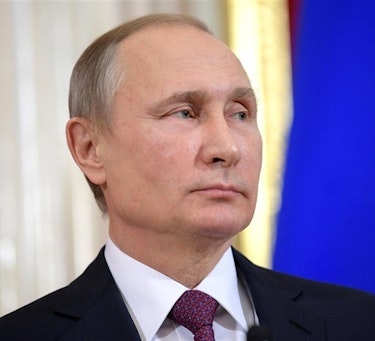Moscow seeks to sow discord during NATO jubilee

Russia's president, Mr. Vladimir Putin
Foto: Wikimedia CommonsIn this Weekly analysis Research Professor at the Peace Research Institute Oslo (PRIO), Dr. Pavel K. Baev, writes about the relations between Russia and NATO ahead of this weeks NATO summit in London. Enjoy the reading!
The Norwegian Atlantic Committee frequently present a time-relevant analysis, handpicked by one of the committee’s partners, employees, or others. If you would like to write the next ‘Weekly analysis’, contact kristoffer@dnak.org. The content of the analysis does not necessarily represent the official view of the Norwegian Atlantic Committee.
The London summit this week marking the 70th anniversary of the establishment of the Atlantic Alliance is a much somber affair than the Strasbourg summit ten years ago. NATO has to gather political will and resources to confront Russia’s aggressive behavior, and the Kremlin courtier-strategists have reasons to assume that the divided “enemies” are not up to this task. They tend to see the erosion of US leadership and the disarray among European member-states as symptoms of profound decline, which one media-savvy politician described as “brain dead”. Seeking to aggravate this disunity, Russia resorts to the combination of show of military might and reassurances in “peaceful” intentions, very similar to the Soviet policies at the peak of the Cold War in the early 1980s.
Just in the last couple of weeks, the Topol intercontinental ballistic missile, and the Kalibr sea-launched long-range cruise missile, and the new Kinzhal air-launched ballistic missile were tested to remind about the progress in Russia’s nuclear modernization. Most of these tests take place in the High North, which has seen several dangerous nuclear accidents this year, including the explosion of experimental nuclear-propelled Burevestnik missile in August. President Putin promised to continue the development of this weapon system “no matter what”. Seeking to add emphasis to these demonstrations, Moscow uses every opportunity to accuse NATO in undue expanding its activities in the Arctic.
This crude pressure is accompanied by diplomatic maneuvering aimed first of all at isolating Ukraine, which has found itself enmeshed in the impeachment process in the USA. Moscow has opted to show a modicum of flexibility (for instance, returning the vessels seized near the Kerch strait last November) in order to weaken support for Ukraine by France and Germany in the so-called “Normandy format”, which is due to hold a summit next week. Another channel for Russian exploiting of disagreements in NATO is opened by cultivating ties with Turkey, and the London summit is set to see how long-simmering recriminations burst into open.
Every discord in the Alliance brings joy to Moscow, but there is more than the habit of hanging together to NATO’s solidarity. The new confrontation is very different from the old Cold War, but a re-energized Western unity emerges from the renewed need to contain Russia’s challenge.
Further reading
Ian Bond, “NATO: Brain dead, or just resting?” Insight, Center for European Reform, 2 December 2019 (https://www.cer.eu/insights/nato-brain-dead-or-just-resting).
Liana Fix & Bastian Giegerich, “European security in crisis: What to expect if the United States withdraws from NATO”, War on the Rocks, 29 November 2019 (https://warontherocks.com/2019/11/european-security-in-crisis-what-to-expect-if-the-united-states-withdraws-from-nato/).
Pavel Baev, "Moscow Seeks to Sow Discord During NATO Jubilee", Eurasia Daily Monitor, 2 December 2019 (https://jamestown.org/program/moscow-seeks-to-sow-discord-during-nato-jubilee/).
Dr. Pavel K. Baev is a Research Professor at the International Peace Research Institute Oslo (PRIO). He is also a Senior Non-Resident Fellow at the Brookings Institution (Washington DC) and a Senior Research Associate at the Institut Francias des Relations Internationales (IFRI, Paris).